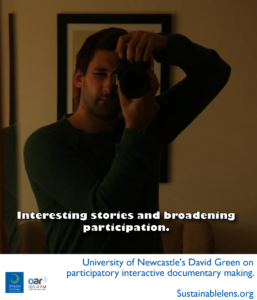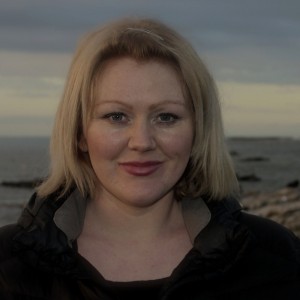Ways of using the structures of documentary storytelling to bring user generated content together…interesting stories and broadening participation.
David Green is a researcher at the University of Newcastle’s Open Lab. His innovative Red Tales is an participatory interactive documentary.
Talking points
I wanted to be an architect, I can’t remember when I changed my mind, but I became interested in photography.
Wildlife photography got me outdoors
Best stories and most engaging stories come from a real heartfelt connection and appreciation.
That’s why I find myself drawn to telling stories about the natural world, I find that’s something I can connect with.
I’m interested in how technology can be used to support people in communities to produce documentaries. So often there are interesting stories that are not getting told because it’s not on the media agenda. Conservation groups working to replant areas on the outskirts of towns – this kind of work is really interesting, and the people doing the work are really interesting, but these stories don’t get told. There must be a way that recent developments technology can enable these stories get out there.
Youtube is good but stories get lost in the vastness of it all.
Ways of using the structures of documentary storytelling to bring user generated content together…interesting stories and broadening participation.
There is value in telling stories, even if no one is listening right now…telling a story to yourself is valuable…and the process is important community building.
The motivation for producing isn’t necessarily to connect with a massive audience.
There’s a complex relationship between storytelling and fact. So does a participatory approach mean letting go of factual basis? Good question, I’ve thought about that a lot. Documentary is a representational form, not fact. There are opportunities for fact checking, to minimise potential for mis-representation.
(Activist?) I consider myself to be a researcher at the moment. I’d love to be an activist, it sounds sexy. I’m doing what I can, I believe that there’s more power in collective action. I’m part of a movement that’s receptive to change. I’m trying to do my bit.
(Motivation?) I’m motivated by what I see are some big problems in the world related to wilful ignorance. I’m motivated by what I see as a serious threat to our existence: climate change; widespread destruction of environment; deforestation – irreversible damage that we’re causing to this planet just by being in it. I’ve come here this morning with a plastic coffee cup – even with the best of intentions it’s very difficult to live sustainably.
Things need to change in a really big way, but this can only start in really small ways. So I’m trying to do my bit, and helping others to do their bit – together we’re strong.
(Challenges?) Political change is afoot.
(Miracle?) Working together, collaboration.
(Advice?) Get out there and photograph things, you never know what might be useful.
This conversation was recorded at CHI 2015.



